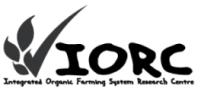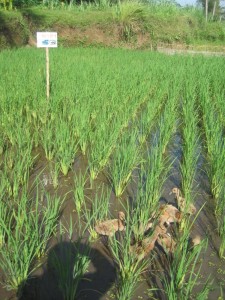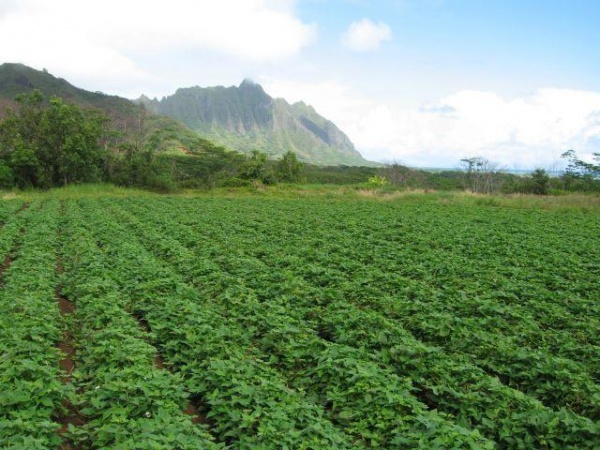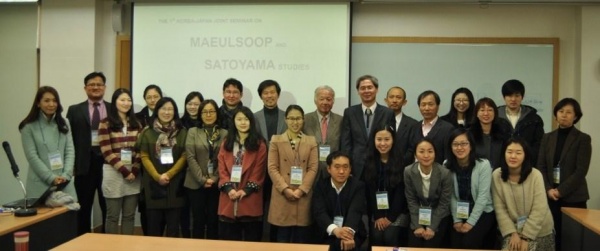IPSI Welcomes Six New Member Organizations from around the World
In March 2013, the IPSI Steering Committee unanimously approved six membership applications, bringing the total number of IPSI members to 132. It is therefore a pleasure to welcome:
- Frontier Works Inc. (website)
- Hawaii State Department of Agriculture (website)
- Integrated Organic Farming Systems Research Centre
(IORC) (website)
- International Centre for Integrated Mountain
Development (ICIMOD) (website)
- Kasho Maeno (website)
- WWF West Africa Programme Office (website)
Upcoming Event
“Satoyama Landscapes in Japan, Germany and Beyond”
Date: 6 April 2013
Location: Tokyo, Japan
At the symposium, scientists from Japan and Germany will present research results and ongoing projects that address various aspects of biodiversity and ecosystem services in Satoyama landscapes. Further research needs will be discussed and funding opportunities to extend Japanese-German exchange and collaboration in this emerging, transdisciplinary research field will be highlighted.
Click for more information and registration
New Member Introduction: Integrated Organic Farming System Research Centre
By: Ms. Uma Khumairoh (Field Coordinator of IORC)
The Integrated Organic Farming System Research Centre (IORC) is a newly founded institution under the Faculty of Agriculture, University of Brawijaya, Indonesia. It was founded in September 2011 on the initiative of the late Dr. Lily Agustina, who had worked for a long period to promote community services in agricultural, especially to empower rural women. In November 2012, Dr. Hagus Tarno was elected as the new coordinator of IORC to guide research and community services as well as to encourage young people on ecological farming. As a new organization, IORC is continuously searching better ideas to get better research direction and other activities includes community services to support sustainable farming and small-scale farmers. IORC focuses on three research domains includes alternative farming, ecological-intensive farming for smallholders, biodiversity and multifunctional agriculture landscape, and socio-economics and traditional cultural of ecological farming. Our past research activity was on the exploring design of ecological-intensive rice system, and it is potentially to be continued. In addition, we did community services to encourage young people from marginal family who live in boarding house to have skill in organic agriculture. We also share knowledge with rural community to optimize their home garden land use and promoting organic agricultural production as well as connecting farmers and actors in agricultural chain to have better mutual relation.
New Member Introduction: Hawaii State Department of Agriculture
By: Mr. Ken Kakesako (Executive Assistant)
Aloha! The Hawaii State Department of Agriculture is honored to be accepted as a new member of the IPSI. As the Department’s mandate is to support, enhance, and promote Hawaii’s agriculture and aquaculture industries, we are also cognizant of the fact that industries’ practices must be done in a manner that also promotes the health and well-being of individuals, communities, and the surrounding environment.
As an island state, Hawaii is keenly aware of the importance of conserving our precious natural resources. Similar to the concept of the Satoyama Initiative, Native Hawaiians termed the tracts of land from the mountain to the sea as “ahupua‘a” and we believe agriculture can play a key role in preserving these watershed resources. The State of Hawaii has grown increasingly dependent on imported foods and products, the transportation of which is dependent on fossil fuels that are both costly and result in a large carbon footprint.
There is a rising consciousness by government agencies, the private sector and the People of Hawaii to move towards greater food self-sufficiency. Ultimately, this means that we must “malama” or “take care” of the earth, so that it can continue to nourish and sustain us. It is inspiring to be able to integrate ancient wisdom with new initiatives towards a better future.
New Member Introduction: International Centre for Integrated Mountain Development (ICIMOD)
By: Dr. Wu Ning (Theme Leader: Ecosystem Services)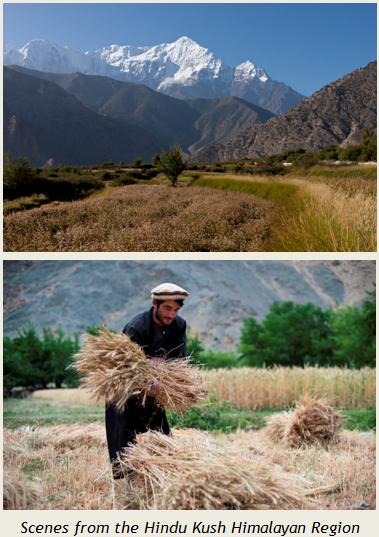
The International Centre for Integrated Mountain Development (ICIMOD) is a regional intergovernmental learning and knowledge sharing centre serving the eight regional member countries of the Hindu Kush Himalayan (HKH) region – Afghanistan, Bangladesh, Bhutan, China, India, Myanmar, Nepal, and Pakistan. Mountains are important global ecosystems facing especially rapid socioeconomic and environmental changes, particularly the impacts of climate change. Our aim is to influence policy and practices to meet environmental and livelihood challenges emerging in the HKH region. To do this we bring together researchers, practitioners and policy makers from the region and around the globe to generate and share knowledge, support evidence-based decision making, and encourage regional collaboration. ICIMOD delivers impact through its six Regional Programmes of Adaptation to Change; Transboundary Landscapes; River Basins; Cryosphere and Atmosphere; Mountain Environment Regional Information System; and Himalayan University Consortium (emerging). These regional programmes are supported by the four Thematic areas of Livelihoods; Ecosystem Services; Water and Air; Geospatial Solutions; and underpinned by Knowledge Management and Communication. ICIMOD seeks to improve the lives and livelihoods of mountain women and men, now and for the future.
Piloting Indicators of Resilience: Empowering Communities for Participatory Monitoring (Update from the COMDEKS Project)
By: Diana Salvemini (COMDEKS Project Coordinator)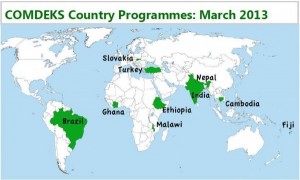
As part of the baseline assessment and community consultation process taking place in COMDEKS project sites, COMDEKS is currently piloting a set of Indicators for Resilience in Socio-ecological Production Landscape and Seascapes (SEPLS), developed by IPSI members Bioversity International and UNU-IAS to help measure and understand the resilience of target landscapes and seascapes. This piloting exercise and the feedback received will help UNDP and other IPSI members refine the overall methodology for understanding landscape resilience.
To date, the community consultation process and the practical application of SEPLS indicators have led to the formulation and approval of COMDEKS Country Programme Landscape Strategies in Ethiopia, Cambodia, Ghana, India, Turkey, Nepal and Slovakia. The SEPLS indicators piloting exercise has enabled the development of participatory transformative strategies that reflect local priorities for the target landscapes negotiated among representatives from local communities, the government, the academia and the private sector. A COMDEKS Country Programme Landscape Strategy is a comprehensive document which outlines the landscape profile, expected goals and outcomes, and key measures and strategies for community-based actions.
In each participating country, with the support of a scorecard developed for this purpose, the practical application of the indicators during the baseline assessment was conducted by measuring elements of SEPL resilience along four interrelated dimensions, namely, ecosystems protection and the maintenance of biodiversity; agricultural biodiversity; knowledge, learning and innovation; and social equity and infrastructure. After each theme was discussed, participants answered a series of related questions, which were then aggregated to depict the communities’ perspective on the resilience of the target landscape.
Through the use of indicators scorecards, interactive mapping exercises, problem tree analysis and focused group discussions, the COMDEKS landscape-wide baseline assessments and community consultations workshops successfully engaged stakeholders in assessing the status of their selected socio-ecological landscape.
For more news from the COMDEKS sites, check out the latest of the project’s quarterly newsletters.
The Community Development and Knowledge Management for the Satoyama Initiative Project (COMDEKS) is a unique global project implemented by UNDP, and funded by the Japan Biodiversity Fund.
First Korea-Japan Joint Seminar on Maeulsoop and Satoyama Studies
By: Dr. Kaoru Ichikawa and Dr. Hongyan Gu (United Nations University Institute of Advanced Studies)
On 27 February 2013, members of the United Nations University Institute of Advanced Studies (UNU-IAS) together with Prof. Kazuhiko Takeuchi, Senior Vice Rector of the United Nations University (UNU), visited Seoul National University (SNU) to exchange information with Korean researchers, and explore possible areas of UNU-IAS’s contribution in the lead-up to CBD COP12, which will be held in South Korea in 2014. The joint seminar started with Prof. Takeuchi’s lecture on satoyama landscapes and Prof. Dowon Lee (SNU)’s lecture on maeul landscapes. This was followed by six presentations from both sides. The seminar ended with a lively discussion during which participants brainstormed the physical and cultural elements of satoyama and maeul landscapes as well as factors contributing to their change.
On the following day, participants visited a maeul site located about two hours’ drive southwest to Seoul. The village has a history of nearly 500 years and its landscape is characterized by mountain at the back of the settlement, a relatively deep valley, well-developed ridges, paddy fields, and a strip of planted trees at the mouth of a watershed. Guided by Prof. Lee, participants walked around the village to understand the roles of village groves in preventing disasters such as typhoon and drought as well as their cultural elements inspired by the Feng Shui principles.




